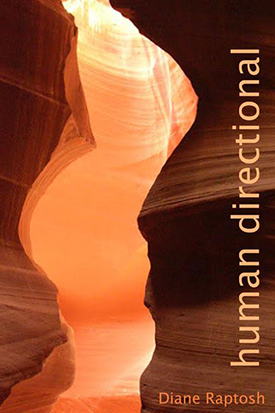Books
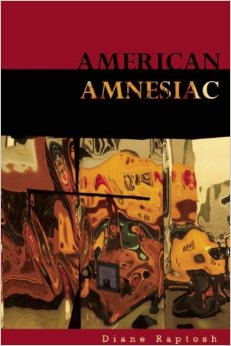  |
American Amnesiac |
Praise for American Amnesiac:
At least as far back as Homer, the blind bard, humans have understood that the lack of one capacity others possess heightens other capacities, grants an attunement that is revelatory. So in the long tradition of Homer, and in the more recent tradition of such works as David Markson’s Wittgenstein’s Mistress and Craig Raine’s A Martian Sends a Postcard Home, Diane Raptosh offers in American Amnesiac, by means of her speaker’s lack of memory, a perspective just mad/alien/quirky enough to be more lucid than a more “normal” point of view. More lucid, and also larger: able to reckon, and reckon with, a national condition as debilitated as his own. American Amnesiac makes a genre of the condition its protagonist suffers: it is a dissociative fugue. What its speaker cannot remember, its reader will not forget.
— H. L. Hix
American Amnesiac lifts the nightmare reflex of The American Dream into the light of what Blake called "realms of day.” American Amnesiac is a poem for people, not empires. That is to say it is merciful , the ethics of poetical grace it has in such abundance.
–Jerome McGann
American Amnesiac is Everyman from the inside out, a truly remarkable work. It records the mental processes of a man suffering from amnesia as flashes of the past impinge on the only world he knows—the now. Its language moves with the speed of thought: rational, irrational, dynamic, but always convincing.
—Richard Shelton
Straddling confession and prophesy, history and myth, intimacy and anonymity, American Amnesiac offers a riveting meditation on a distinctly American condition. We are lost and at home in its world, a world in which past and present collide and identities fold and collapse. Following the hypnotic voice of the amnesiac speaker, the stranded reader stumbles along in a landscape marked by its own odd, jarring, incoherent signposts--shreds of a past as recognizable as it is impenetrable (the relentless refrain is, after all, “My name is John Doe”) and scraps of a world reduced to a collection of headlines, names, titles, symbols, letters--familiar and cryptic at once. With her consummate craft, Diane Raptosh has given us a collection of stunning, timely, and unforgettable poems.
—Edvige Giunta
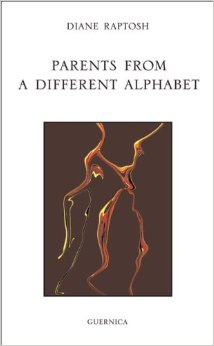  |
Parents from a Different Alphabet |
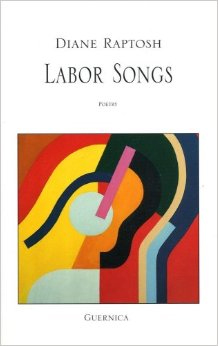  |
Labor Songs |
Praise for Labor Songs:
Raised in Idaho, where she teaches at the College of Idaho, Raptosh (Just West of Now, 1992) continues to find inspiration in the western landscape for these modest and likable poems that move with pleasant rhythms. While some of her simple songs celebrate images of the state (“On Living Here” and “Western Idaho Fair”), others take on the voices of workers, from the female farmer in Homestead, Oregon, who’s slightly crazy to the retired GM employee from Detroit who offers an inspired prayer for her family (“Giuseppina’s Petition”). Raptosh also assumes the voice of a notorious midwestern book thief and of the 5,000-year-old man newly discovered in the Alps (“The Iceman’s Oracle”). The poet’s wry and easy humor reveals itself in her wonderful study in perspective, consisting of three views of Mary chastising the Infant Jesus: from Max Ernst, who painted a version; from Joseph, who’s just a regular-guy carpenter; and from Dr. Spock. Raptosh sings sweetly of the unison wingbeats among pelicans, quail, pigeons, and guinea hens; her simpler songs also extol the glories of motherhood: nursing her daughter (Drinking Song); rocking her to sleep (Late Autumn Nocturne); and the actual moment of birth in the title poem, a chantlike verse that captures the hard-breathing rhythms of labor itself. Raptosh’s lovelier poems never cloy, and she elsewhere wishes for her daughter what she herself enjoys: the reverie / of place.
—Kirkus Reviews
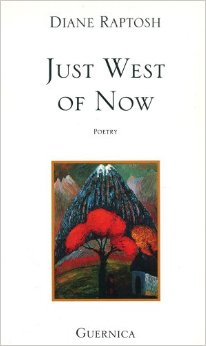  |
Just West of Now |
Praise for Just West of Now:
Diane Raptosh’s poems balance reticence against revelation to create a poetry that is urgent, fresh, and beautiful. On the deepest level, these poems are concerned with our failures of communication, the limitations and possibilities of speech, the search for a literal and figurative home, the entanglements of love given and received. Whether she writes of stuttering or of an ill-fitting gift, her work glows with intelligence, wit, and emotion. The book’s lively dramatic monologues are sure to provoke sighs of recognition, as well as some thoughtful amusement. In fact, Diane Raptosh’s work will please those who don’t read much verse as well as those who read little else. Full of heart (without sentimentality) and passion (without melodrama), Just West of Now is an extraordinary first book. It introduces a young poet of startling gifts, whose presence should invigorate our literature for years to come.
—Alice Fulton
Selected Anthologies
http://www.amazon.com/Verse-Chorus-Call-Response-Anthology/dp/0991297504/ref=sr_1_1?ie=UTF8&qid=1396142183&sr=8-1&keywords=verse+chorus+anthology
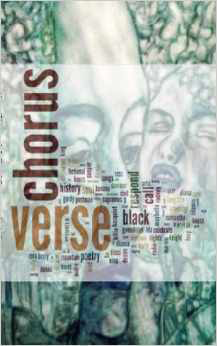  |
Verse/Chorus: A Call and Response Anthology, 2014 (2014)Verse/Chorus is a diverse collection of literature written in response to African American history. Coming out of a workshop tradition, this anthology features the work of 27 contributors who wrote poems, stories, and essays about and for African American historical figures. Ella Fitzgerald, Billie Holliday, Langston Hughes, Son House, Gwendolyn Brooks, Marvin Gaye, and many other great men and women are celebrated in this volume as the contributors "respond" to their works, lives, loves, pain, and joy |
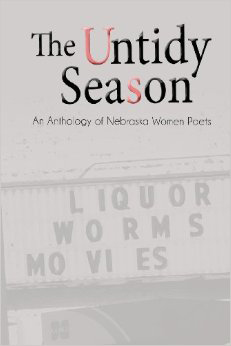  |
The Untidy Season: An Anthology of Nebraska Women Poets (2013)The Untidy Season: An Anthology of Nebraska Women Poets takes its readers through the lush alphabet of Nebraska poetry-from Adkins to Zumpfe-with selections of poetry by nearly 90 native-born or transplanted Nebraska writers who write and live fearlessly and with great skill. Their topics range from the beginnings of life to the end-family relationships, loss, misunderstandings, work, trust, betrayal, love and hate, bereavement. Through those lives--because of them--these poems emerged, an indelible record of the triumph of the human spirit. The four editors of The Untidy Season, each an accomplished poet in her own right, searched for poems of clarity, honesty, passion, and brilliance. One of the editors wrote: "We were drawn to work that both celebrated and subverted the 'typical' Nebraska experience, the 'typical' experience of motherhood, the 'typical' experience of womanhood. I suppose my own aesthetic leads me to be drawn to work that challenges 'typical,' but much of the work we experienced over that year of reading submissions forced me to engage with my own stereotypes and see inside them." |
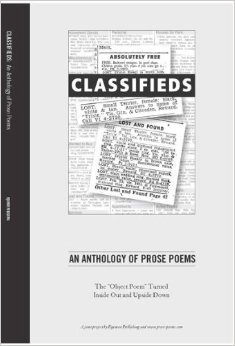  |
Classifieds: An Anthology of Prose Poems (2012)A delightful collection of literary "Classifieds" entries made up of contributions from over 70 writers and poets. CLASSIFIEDS is an anthology that brings an early form of the 200-year-old prose poem - the "object poem" - to its modern-day outer edges: the object and all its usual associations deconstructed. Where readers of ordinary Classifieds must be satisfied with the shorthand that compartmentalizes, categorizes, and otherwise reduces commodities to their physical properties or monetary value, these poems dissolve that constraint. Where traditional Classifieds hide the real story, these - as poems will - reveal the disturbance driving each proposed transaction. Naturally, this collection also expands the concept of what constitutes object. Sometimes poignant, sometimes amusing, these announcements were written by writers as varied, and as unbeknownst to each other, as community members placing the entries in any Classifieds newspaper section. Part of the spirit of this collection is the sense of synchronicity that brings these particular "notices" together. |
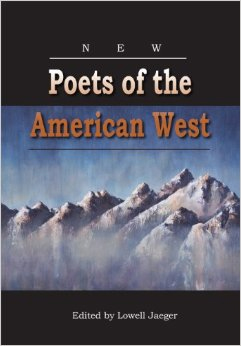  |
New Poets of the American West (2010)Collected here are poems about horse racing, mining, trash collecting, nuclear testing, firefighting, border crossings, buffalo hunting, surfing, logging, and sifting flour. In these pages you will visit flea markets, military bases, internment camps, reservations, funerals, weddings, rodeos, nursing homes, national parks, backyard barbecues, prisons, forests, meadows, rivers, and mountain tops. In your mind s eye, you will meet a simple-minded girl who gets run over by a bull, two mothers watching a bear menacingly nosing toward unsuspecting children, and children who have yet to be toilet trained out of their souls. You will learn to reach into the sacred womb, / grasp a placid hoof / and coax life toward this certain moment. You ll teach poetry to third graders, converse with hitchhikers, lament for an incarcerated brother trying to fill the holes in his soul / with Camel cigarettes / and crude tattoos. You will sit at the kitchen table where perhaps the world will end while we are laughing and crying, eating of the last sweet bite. In the short time each of us has in this world, here’s your chance to experience life widely and to reflect on your experiences deeply. |
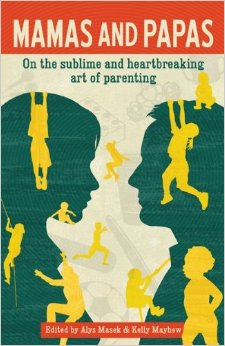  |
Mamas and Papas On the Sublime and Heartbreaking Art of Parenting (2010)In this lively and engrossing collection, texts explore all aspects of parenthood from the first stirrings of desire for a baby to the bittersweet experience of watching your children go off into the world without you. In poetry, fiction and essays, the writers examine the primal and powerful bond between parent and child. Writers share their most intimate experiences of motherhood and fatherhood. The book celebrates the satisfaction and joy that parenthood offers. Yet it does not shy away from the dark side of parenting. Writes offer up eloquent and honest testimonies to their anger, frustrations, doubts and failures as parents. Pieces range from the laugh-out-loud funny stories of Sam Apple's foray into a Mommy and Me yoga class with his son and Neal Pollack's adventures with his son's initial attempts at texting, to Wanda Coleman's stark poetry of poverty and Ella Wilson's quietly devastating account of her brush with postpartum depression. The contributors survey everything from the emotional toll of IVF to the perils and rewards of international adoption. Welcome to the wild and wonderful world of parenting. |
  |
Families: The Frontline of Pluralism (2008)The difficulties of living up close and personal with diversity-of sensibility, race, sexual orientation, culture, class, or religion-is the subject of the stories, memoirs, and poetry in this anthology. In these works by thirty-five contemporary writers we learn what it means to absorb the intimate implications of being of mixed race, to be raised by a parent who suffers from being on the wrong side of history, to carry the burden of immigrant parents' self-sacrifice. We learn what it means to fully live out choices to marry across religion or culture, to hear our children chatter happily in a language we can't speak, to feel our imagination try to find its way into a world completely alien to us, still raw with the wounds of civil war. We learn about the tension-and love-that develop between siblings when one is disabled; the violence that carries across marriages; what it means to create relationships with children after divorce, or to make a space in our own heart for the children of step-children. We learn how completely parenthood shifts our priorities, whether we are lesbian parents adopting children from Guatemala, a single mother expanding her family of two with another child from China, a lesbian mother shifting sexual orientation to create a stable family clan, a white poet fostering a black child from an inner-city ghetto. |
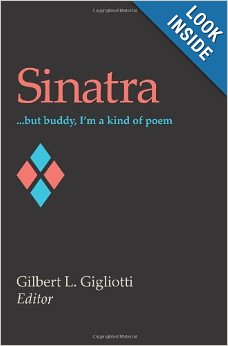  |
Sinatra: . . . but buddy, I'm a kind of poem (2008)Gilbert L. Gigliotti's 'SINATRA ...but buddy I'm a kind of poem' offers both fans of Old Blue Eyes and fans of poetry a rich anthology of verse referencing Sinatra in every possible way. |
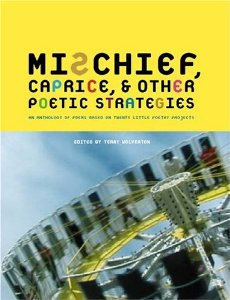  |
Mischief, Caprice, and Other Poetic Strategies (2004)As its title, moving cannily from mischief and caprice to the sterner strategies, clearly implies, this is an anthology based on the premise that a good poem is the fruit equally of play and work. Paul Valéry famously hypothesized that verse is as ludic as prose is laborious, but he knew deep down the two qualities are inextricable for the poet. Indeed, the infinitive to play derives from an Indo-European root, plegan, which also produces to pledge and covers the spectrum of meanings allowed by to exercise oneself. Work and orgy come from the same linguistic source; the worst puns can bring out the best in us; and rules can lead us into a delightful labyrinth. Each of these poets will confirm the point made by Rhoda Janzen that Idling would stall any engine but mine, and all of them will recognize the relevance of effortful ease in Kate Gale’s identification of herself and her poem with a rainbow dragon kite / with a long tail (though no one else here can offer such a doubly rhyming last name in evidence). This collection reminds us of what we cannot be too often reminded, that writing poems is (in Marianne Moore’s words) the Mogul’s dream: to be intensively toiling at what is pleasure. |
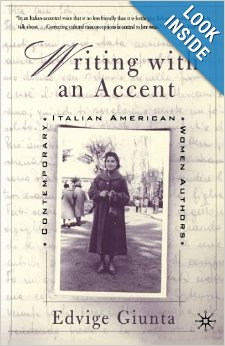  |
Writing With An Accent: Contemporary Italian American Women Authors (2002)Writing with an Accent explores the variety of uses of ethnic voice in the narratives of contemporary Italian American women. Writers such as Mary Cappello, Louise DeSalvo, Agnes Rossi, Helen Barolini, Tina De Rosa, and Sandra M. Gilbert enact, in their works, a self-silencing of ethnic voice, critically modifying accepted representations and mythologies of Italian American culture through distinct and inventive narrative inflections. Accent, that which emphasizes and alters language, functions as the cultural and metaphorical lens through which Giunta reads a rich body of work that is still awaiting widespread recognition.
|
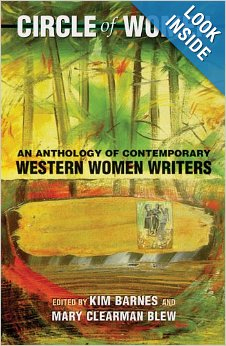  |
Circle of Women: An Anthology of Contemporary Western Women Writers (2001)This striking array of stories, essays, and poems reflects women’s experiences in the American West. Though the tales they tell reflect a variety of viewpoints, these writers share the struggle against the overwhelming isolation brought on by gender and the physical environment.
|
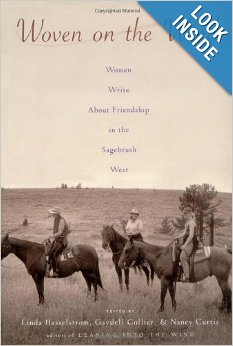  |
Woven on the Wind: Woman Write About Friendship in the Sagebrush West (2001) The American West conjures images of wide-open spaces, harsh but beautiful landscapes embroidered with winding rivers and streams, long dusty roads to nowhere, sagging barbed wire fences that separate neighbors in the loosest sense. Here the only hustle-bustle is the wind gathering strength across the plains and the rush to get a day's work done before darkness swallows the countryside whole. In this region where time and space are writ large and solitude is a fact of life, how exactly do friendships among women develop, let alone thrive? What does that human connection provide; what does it mean? And what can these friendships teach us about these women, about ourselves?
|
